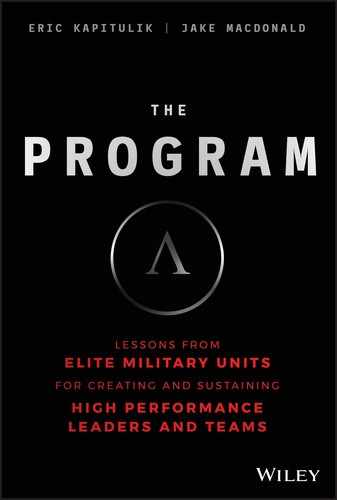65
Long-Term Greedy
THE VENERABLE FINANCIAL institution Goldman Sachs teaches its new hires: “Never make a short-term financial decision at the expense of long-term wealth creation.” For your client, or yourself, be “long-term greedy.” There are numerous factors that determine The Program’s decisions. First, is the decision in line with our Core Values? Second, will it help us accomplish our mission? Finally, we may call a trusted mentor or, at the very least, think about what an influential person in our lives would do or suggest to us. All these factors influence our decision-making process. However, when faced with a tough decision, the long-term greedy answer is the correct one. Stacey Pesce wanted to be nice to her Female Engagement Team and not train the extra hours that she and their mission demanded. Those extra hours were long-term greedy, though. I want ice cream for dessert most nights. Should I have it? I want to buy my children the toys they ask for every time we go shopping. Do I buy them? I don’t want to work out. I want to take today off. Not working out means that I have an easier day—I won’t experience discomfort. Should I stay sitting on the couch? I want to golf today. I want to go out tonight. I don’t want to study/work. I’m tired. Does the extra studying/work that I could do really make that big a difference? Happiness is internal. It is a state of mind. We remain happy regardless of the presence or absence of external factors. Happiness is long-lived. Pleasure is dependent on external factors. We have a feeling of pleasure only for as long as the external factor lasts. It is momentary.1 Like the first two little pigs, we might be able to have more pleasure now if we make decisions based on our desire for it, but we must remember that pleasure is short lived. Eventually, a big, bad wolf (or a terrorist group, a bad economy, or an injury to our starting quarterback) will come and blow our house (or life) down. That will not make us happy. In Goldman Sachs terms, the short-term, “easy” decision may give us more pleasure, but it almost never makes us long-term happy. We derive pleasure from a bowl of ice cream, but the ability to play with our kids makes us happy. Watching more TV gives us pleasure. A workout during that time provides us with more energy to devote to stronger, healthier relationships with co-workers and family members. That makes us happy. Easy days spent lounging by the pool gives us pleasure, but a long, tough, challenging commitment to, and achievement of, a personal or team goal makes us happy. This is not to say that we should never eat that bowl of ice cream or take a day off from work or studying, but rather to ask yourself prior to doing so whether this is a short-term, pleasure-driven decision, or whether it will make you happy. Stacey and her FET teammates consistently chose happiness. More free time to relax while in Afghanistan would give them pleasure. However, the long-term greedy decision was a commitment to an incredible amount of hard work, to doing One More•. It would allow them to return safely to family members and friends upon completion of their deployment. That would make them happy. Instead of doing things that only give you pleasure, be long-term greedy. It will make you happy. One More™ is that commitment.Note
